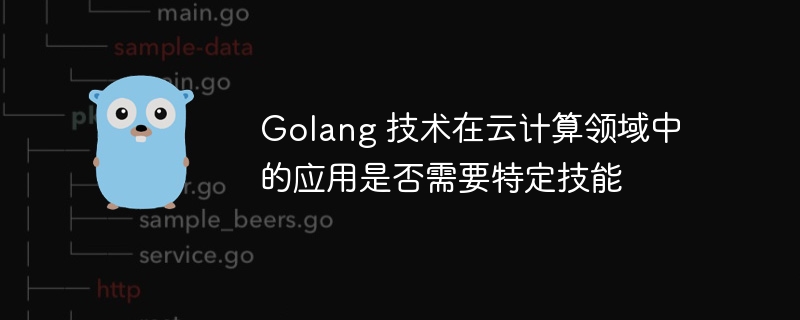
Go language is widely used in cloud computing. Its advantages include: high concurrency, cross-platform support, lightweight and efficient, and concise syntax. Skills in cloud computing fundamentals, concurrent programming, cloud service APIs, and distributed systems are critical. The Go language can be used to build serverless functions and deploy Kubernetes applications.

Application of Go language in the field of cloud computing
Introduction
Go, Also known as Golang, it is a compiled programming language with simple syntax and excellent performance. It was developed by Google and is widely used in cloud computing. Go skills are essential for developers who want to develop high-performance, scalable, and reliable applications in the cloud.
Advantages of Go language in cloud computing
Specific Skills
While getting started with Go is easy, there are certain specific skills that need to be mastered for those who wish to leverage it effectively in the cloud computing world Crucial. These skills include:
Practical case
Using Go to build serverless functions
Serverless functions are an on-demand execution Cloud computing model for code. Using Go makes it easy to build serverless functions, such as:
package main
import (
"context"
"fmt"
"log"
functions "cloud.google.com/go/functions/apiv2"
"cloud.google.com/go/functions/apiv2/functionspb"
)
func main() {
ctx := context.Background()
client, err := functions.NewFunctionClient(ctx)
if err != nil {
log.Fatal(err)
}
defer client.Close()
req := &functionspb.CreateFunctionRequest{
Parent: "projects/PROJECT_ID/locations/REGION",
Function: &functionspb.Function{
Name: "helloHttp",
Entry: "HelloHTTP",
Runtime: "go115",
SourceCode: &functionspb.Function_InlineCode{
InlineCode: "package main; import \"fmt\"; func HelloHTTP(w io.Writer, r *http.Request) { fmt.Fprintln(w, \"Hello, World!\") }",
},
},
}
resp, err := client.CreateFunction(ctx, req)
if err != nil {
log.Fatal(err)
}
fmt.Printf("Function created: %s\n", resp.GetName())
}Deploying Kubernetes applications using Go
Kubernetes is a container orchestration platform. Go makes it easy to deploy and manage Kubernetes applications such as:
package main
import (
"context"
"fmt"
"log"
"k8s.io/api/apps/v1"
metav1 "k8s.io/apimachinery/pkg/apis/meta/v1"
"k8s.io/client-go/kubernetes"
)
func main() {
ctx := context.Background()
cfg, err := rest.InClusterConfig()
if err != nil {
log.Fatal(err)
}
clientset, err := kubernetes.NewForConfig(cfg)
if err != nil {
log.Fatal(err)
}
deploymentsClient := clientset.AppsV1().Deployments("default")
deployment := &v1.Deployment{
ObjectMeta: metav1.ObjectMeta{
Name: "hello-kubernetes",
},
Spec: v1.DeploymentSpec{
Selector: &metav1.LabelSelector{
MatchLabels: map[string]string{
"app": "hello-kubernetes",
},
},
Template: v1.PodTemplateSpec{
ObjectMeta: metav1.ObjectMeta{
Labels: map[string]string{
"app": "hello-kubernetes",
},
},
Spec: v1.PodSpec{
Containers: []v1.Container{
{
Name: "hello-kubernetes",
Image: "gcr.io/google-samples/hello-app:1.0",
},
},
},
},
},
}
resp, err := deploymentsClient.Create(ctx, deployment, metav1.CreateOptions{})
if err != nil {
log.Fatal(err)
}
fmt.Printf("Deployment created: %s\n", resp.GetName())
}The above is the detailed content of Does the application of Golang technology in the field of cloud computing require specific skills?. For more information, please follow other related articles on the PHP Chinese website!
 How to define variables in golang
How to define variables in golang
 What are the data conversion methods in golang?
What are the data conversion methods in golang?
 What are the commonly used libraries in golang?
What are the commonly used libraries in golang?
 What is the difference between golang and python
What is the difference between golang and python
 eclipse tutorial
eclipse tutorial
 Digital currency trading platform
Digital currency trading platform
 How to solve the problem that wlan does not have a valid ip configuration
How to solve the problem that wlan does not have a valid ip configuration
 How to solve Java large file read exception
How to solve Java large file read exception




